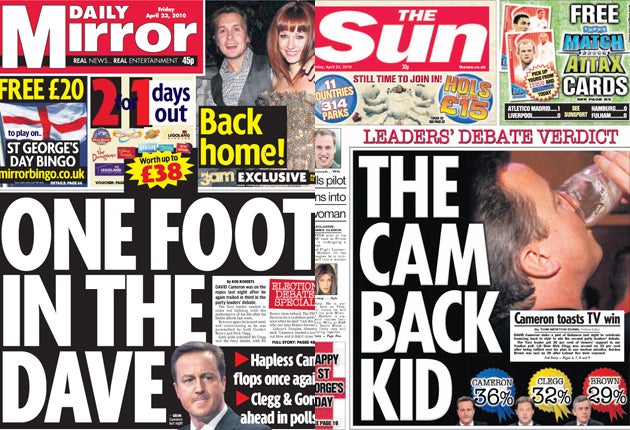Someone tell the press that rules of the game have changed
Media Analysis

This election campaign, like none before it, has demonstrated the raw power of live television. It has also painfully exposed the dwindling credibility of the red-top press, the papers "wot" used to think they could decide who won it.
Propagandists they have always been, especially in the run-up to polling day. But this time, the defining moments of the campaign are being played out before an audience of millions. "Cameron toasts TV win" reported The Sun yesterday, describing how "The Cam Back Kid", or "Cam the Man" if you will, had "savaged" Gordon Brown. The paper pictured the Conservative leader swigging a pint of Guinness and earlier jogging with a soldier in combat fatigues, and ridiculed the televised performance of his Liberal Democrat rival under a near 180-point headline: "Clegg Nuked".
In the newsroom of the Daily Mirror, the debate was judged entirely differently. Here again, there was only one winner: "I am your man" was the message, alongside a photograph of Mr Brown. It hired a "body language expert", Professor Geoff Beattie, whose opinion, informed by data on the frequency of licked lips and the quantities of forehead sweat, was that "Gordon Brown came out on top".
Of course we know the allegiances of these two titles. Yet gone are the days of when reporters in distant constituencies filed reports to suit the party line. Never has it been more dangerous to take voters' opinions for granted. That goes for tabloid newspapers and all other media organisations, whose consumers are faced with a plethora of other sources of accessible information.
Thursday's Sky News debate was close run. David Cameron and Gordon Brown both upped their game and Nick Clegg, while still the most comfortable performer, found himself challenged with a greater intensity over his party's policies. That was how the public saw it. According to the five major polls, Clegg was ahead in three and Cameron two. Sky News itself declared the overall outcome as a draw, with Clegg and Cameron each taking 33 per cent share and Mr Brown on 27 per cent.
The quality newspapers mainly reflected this. "Clegg weathers the storm" concluded The Guardian. "This time it's personal," declared The Independent, referring to a more combative encounter in which the presenter Adam Boulton showed less inclination to restrain the speakers than ITV1's Alastair Stewart. The Daily Telegraph, after questioning the Liberal Democrat's financial probity the day before, yesterday acknowledged "Clegg gives another strong performance in TV rematch", beneath the justifiable headline: "Cameron fights back".
Slightly out of step was the Rupert Murdoch-owned The Times, which could not resist relying exclusively on its own poll by Populus, which put the Tory 1 per cent in front, in order to support the splash: "Cameron nicks it". On Wednesday, Rupert's son James, who oversees The Times and The Sun, burst into the offices of The Independent to make a foul-mouthed complaint over this newspaper's advertising slogan: "Rupert Murdoch won't decide this election – you will."
No doubt The Sun will justify its verdict of a clear Conservative victory in the Sky News debate by pointing to its own YouGov poll, which placed Cameron on 36 per cent, four points ahead of Clegg.
But such a selective, emphatic approach is flawed, when millions see these occasions for themselves. The ITV1 event attracted a bigger audience than Coronation Street. Thursday night's contest drew 4.1 million. Many more have accessed follow-up coverage on BBC and ITV news bulletins, on Facebook and multiple other websites. It would be foolish to think that readers of the Mirror and The Sun simply allowed it all to pass them by.
Reporting only the favourable elements (and positive polls) of such a public occasion is like covering an England football match, broadcast live to the nation, and refusing to acknowledge goals scored by the opposition. In a modern media era when consumers are never far from an alternative news source, that just won't cut it.
Join our commenting forum
Join thought-provoking conversations, follow other Independent readers and see their replies
Comments